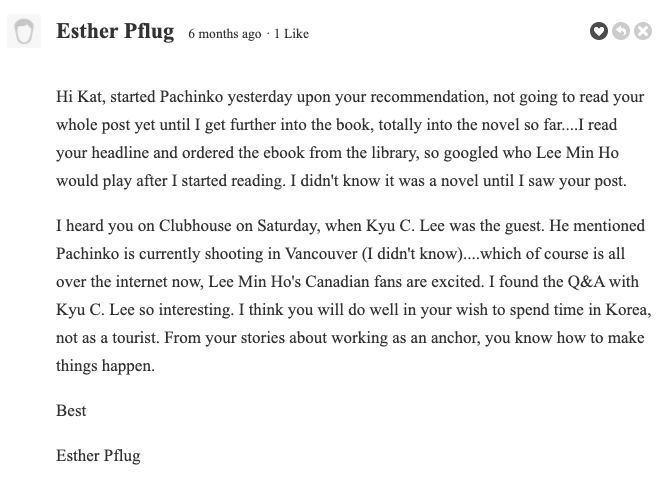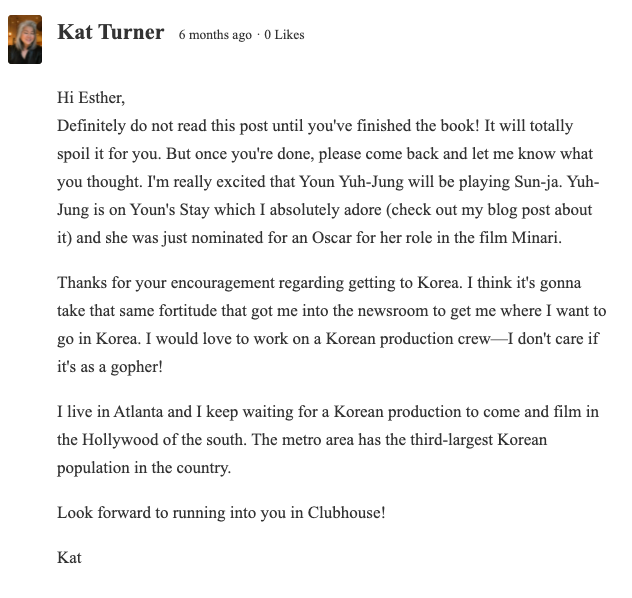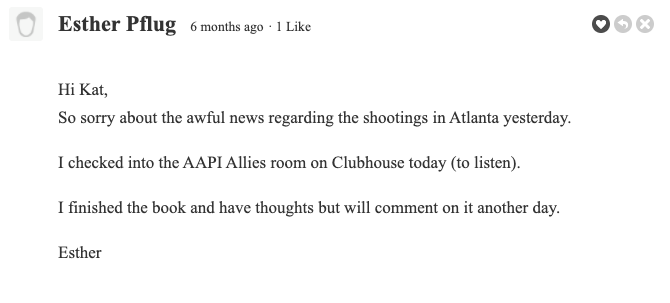Pachinko: Lee Min-ho Risks Reputation For AppleTV+ Production of Min Jin Lee Novel
I pulled myself away from K-dramas long enough to read Pachinko, a novel by Korean American author Min Jin Lee. As a Korean adoptee, I know very little history about Korea so I appreciate all the historical references the story is wrapped in. I am slowly learning more about the country of my birth.
Filming is currently underway for the AppleTV+ production. K-drama fans will be interested to know Lee Min-ho and Jung Eun-Chae from The King: Eternal Monarch have both been cast as central figures in this story. Youn Yuh-Jung, who was just nominated for a Best Supporting Actress Oscar for her role in Minari, is also in the cast. I discovered YJ on Youn’s Kitchen 2 and Youn’s Stay and find her to be lovable and endearing.
**SPOILER ALERT: If you have not read Pachinko I recommend you wait to read this post if you don’t want to know what happens.**
Reading a book before seeing a televised or film version can be risky. Very rarely does the screen version live up to the written word but I’m one who still wants to know the details from the book that get left out of screen productions. Even though I’m usually disappointed, I will always advocate for reading the book first—and I’m always curious enough to watch the screen version. I have hope for Pachinko because the plan is for four seasons with eight episodes each—longer than a movie but half the episodes of an average Korean drama season. As a fan of Lee Min-ho, I was curious about the character he will be portraying, Koh Hansu. Hansu is a yakuza which is a Japanese organized crime syndicate similar to the Mafia, so he’s a gangster/racketeer. My first impression when Hansu was introduced in the story was asking myself how I’m going to handle seeing Lee Min-ho as the antagonist? I think Min-ho himself had doubts about whether he would be chosen for this role. It was the first time he’d been asked to audition in a decade.
“In the car on the way to the audition, the thought suddenly occurred to me. ‘No, wait a minute. If I go to an audition and fail, will there be rumors?”
I am praying they do not change Hansu for the AppleTV+ series—I’m actually looking forward to seeing Min-ho portray the character as written. I definitely hope we do not see the Koh Hansu that Caroline Kennedy has in her head. I was honestly shocked when I read the end of her 2017 review for Pachinko from the Martha Vineyard Book Festival.
“And finally, in case you think I am not making this book sound like the fun summer read it is, I also want to congratulate Min on creating a great romantic hero in Hansu — he is Heathcliff, Percy Blakeney, Mr. Darcy, Rhett Butler all rolled into one — with a gangster twist.”
First of all Pachinko was not a fun read—no matter what season it is. The story is quite tragic and the characters face one hardship after another. Good read—yes—but fun would not be a word I would ever use to describe this novel. As for romantic hero—what book was Caroline Kennedy reading? Koh Hansu is described as elegant and dashing. And yes, he does look after Sunja and her family (mostly from afar) throughout the story. But Min Jin shows us from the minute we meet Hansu that he basically stalks 16-year old Sunja, then grooms her with the intention of having a physical relationship with her. The man is described as being the same age as Sunja’s mom, 36—and old enough to be her father. He wins her trust by showing interest in her and telling her he’s like an older brother (Oppa, 오빠). Sunja is poor, has never been outside her town, or even had a boyfriend. Koh Hansu is very wealthy, well-traveled—and a crime boss. The power dynamic is completely out of balance. Hansu is the very definition of a predator as it relates to Sunja.
Just because Hansu wants Sunja to be his “Korean wife” (aka mistress) once he learns she’s pregnant doesn’t qualify him as romantic. Sunja is so naive it never dawns on her he was already married with kids. But her reputation has been sullied to the point no “decent man” will want her (based on the era and culture). Min Jin reminds us frequently of Hansu’s yakuza status—at one point describing how he beats a female escort nearly to death with graphic bloody detail. His son Noa leaves his mom and brother when he finds out Hansu is his biological father, then kills himself rather than have his wife and kids discover his yakuza bloodline and connection to Hansu. Financially providing for Sunja and Noa hardly makes up for everything else. How is this even slightly romantic? In my opinion, the way Min Jin has written Koh Hansu I don’t believe the author intended for anyone to view Hansu as a romantic hero. Complicated yes. Having conflicted feelings of empathy for him at times? Maybe. But romantic hero? Absolutely not.
I am looking forward to watching the AppleTV+ series but I’m a bit worried because they’re introducing a female character not in the book which seems unnecessary unless they’re changing the story. The story revolves around Sunja as this is a journey through four generations of her family. Koh Hansu does not dominate the story and there are very large gaps in-between his appearances. As much as I admire Lee Min-ho, I believe it would be doing the book a disservice if the focus is on Hansu. Youn Yuh-Jung will be portraying the older Sunja so I’m excited to see her portrayal.
My worries over how the television series will depict the book aside, if I’m honest, the novel left me with a few nagging questions. Min Jin presented the characters in such a way you really want to know more about them. But just as you’re totally invested they disappear—sometimes with barely an explanation. Haruki, Mozasu’s friend who is gay but married is probably the best example of this. Haruki’s wife sees him with another man but there’s no mention of the impact of this information. In fact, Haruki is only mentioned one more time when he’s faced with talking to the parents of a suicide victim and he shares that experience with Mozasu.
Equally jarring was the suicide of Noa. To me, it made no sense given how his character was portrayed. We’re told Noa was prepared for Sunja and Hansu to find him and given that he shoots himself minutes after seeing his mom I’m left with the impression that taking his life was his plan all along if he was found by them. But as the caring, sensitive—and very disciplined person he’s been described as—it seemed to me he would have been more likely to remain single his entire life rather than marry, and bring kids into the world, knowing once he’s found he planned to take his life. Without a family, not only does the need to worry about his identity being revealed lessen greatly but there is also no wife and kids whose lives it was said were ruined by his death. Despite the questions I was left with—even in real life, we rarely if ever get a neatly wrapped up answer when a loved one dies by suicide. This includes the fact many times it’s something nobody saw coming.
*This next paragraph was corrected and updated to reflect new information about Soji Arai. I was originally misinformed and thought a Japanese actor was cast to play the character of Mozasu (who is Korean). But I just learned from Buzzfeed that Soji Arai is actually Korean. He’s what is known as a Zainichi Korean which means he is Korean but born in Japan. In a Rolling Stone interview, Arai said he wanted to help the word Zainichi be introduced to American dictionaries. A good place to start would be the people who put out the casting news for Pachinko. Every mention of casting I came across all said Soji was a Japanese actor based out of America. Because racial identity is a central theme throughout Pachinko and we see how it impacts the characters’ self-worth and day-to-day lives I was definitely disappointed to think a Japanese actor was cast in the role of a Korean. Not because I have anything against being Japanese but it felt like (once again) as long as he was Asian it wouldn’t matter, which doesn’t recognize the uniqueness of being Korean or Japanese. It gives me goosebumps to learn Soji Arai is a third-generation Zainichi Korean of a real-life family very similar to Sunja’s. The entire story is based on how poorly Koreans were treated by Japan during and after the occupation—Koreans were looked down upon to such a degree many of them pretended to be Japanese. Mozasu is one of the characters who wasn’t really trying to hide his Korean identity so knowing the actor playing him could literally be him (one generation later), is pretty cool. Just to be clear. Soji Arai is of Korean blood born in Japan, and living in the U.S. (he’s a citizen).
“I read the book when it was initially published and loved it. I thought it was my story, my family’s story. So, the second I read the article that said Apple was making a series based on Pachinko, I called my agent and manager!!! In the audition process, I had to learn the lines in Japanese, Korean, and English. I talked about my late first-generation grandmother, who is just like ‘Sunja’ in Pachinko in my audition tape. I believe my grandmother in heaven helped bring this opportunity to my life. I then was cast as ‘Mozasu’; who is second-generation Zainichi-Korean, the owner of the Pachinko parlor, and ‘Sunja”s second son.”
I’m excited to see the series once it comes to AppleTV+ and prepared as much as one can be for it not to be exactly like the book. If we do get four seasons it would allow more time to tell more of the story—something you never get in a 2-hour movie. As a fan of Lee Min-ho, I’m glad he has the opportunity to play this character let’s just hope the character he’s given doesn’t depart from who Koh Hansu is in the book, a character with a very dark side—not a romantic hero with a gangster twist.
[UPDATE 8/27/2022]: Meeting Min Jin Lee in Seoul!
APPLETV+ PRODUCTION
“Rather than just that, when I read the script, something happened inside of me. It was a complex feeling. I thought it would be new to take a view of Korea through the eyes of foreign people. In terms of filming the history of our country with foreign capital at such a high cost, the question ‘Should I do this?’ I felt that way,”
Lee Min-ho Esquire Magazine Interview
Pachinko Trailer
Soo Hugh & Rai Tobaccowala Talking All Things Pachinko
Soji Arai BBC Interview
SHOW UPDATES
2/7/22 After reading a Harper’s Bazaar article about the adaptation of Pachinko I am hopeful. I’m particularly relieved to see how historically accurate Soo Hugh wanted to keep the AppleTV+ production—even if it strays from the book a bit.
Pachinko Review & Lee Min-ho interview by my K-drama friend Marianna Baroli for PANORAMA
APPLETV+ SERIES
3/25/22: I didn’t have AppleTV+ so I did their free 7-day trial just so I could watch the first three episodes when they dropped at 12-midnight EST on March 25th. I set an alert for the show and just shortly after 9:00 PM received a notification it was available. I thought there must be a mistake since it was three hours earlier than when was advertised so when it turned out to be accurate I immediately went live on Instagram to let everyone know about the surprise early drop!
And of course, I watched all three episodes right there and then!
The intro for Pachinko stands out because it’s so fun, colorful, and festive with music and dancing set in a pachinko parlor. It’s also ironic given how heavy the story is but I didn’t fast forward through it on even one of the three episodes.
While Pachinko is a story about a Zainichi Korean family, features many Korean actors, and many scenes were filmed in Korea—it actually is not a Korean drama—it is an American drama. About a Korean story. It’s especially important to note this because it’s the first time a series with mostly all Asian characters has been greenlit in America. Even with the success of Parasite, Minari, and the popularity of K-dramas and K-pop—Hollywood still seems mostly clueless to the fact Americans will watch (and enjoy) Asian actors on-screen. I hope Pachinko is one more reason Hollywood will finally have to start featuring Asian Americans in their productions. I love K-dramas but I should not have to go all the way to Korea to see people who resemble me on screen.
Showrunner Soo Hugh also recognized the importance of the story being told in the native language of each character so three languages (Korean, Japanese, and English) are featured—something else we’ve not seen in an American production. It actually caught me off guard how unnatural it was for me to be hearing dialogue in English. I’m a native English speaker but since discovering K-dramas early on in the Covid19 pandemic I don’t really watch American television anymore. Everything I watch has a subtitle so I was pretty much right at home watching Pachinko. The extra step of putting each language’s subtitles in a different color is another important gesture of recognition.
Another thing that really stood out for me was listening to Sunja and Kyunghee talk about the fact they’d never been back to Korea. Since I was only one when I was sent to the U.S. I don’t have any memories of Korea but for most of my life, I had images in my brain that didn’t match up with what Korea has become. Thanks to K-dramas I have a better idea of what I can expect. Just like Sunja and Kyunghee I also don’t have anyone (that I know of) waiting for me to come back. And I wonder if I’m too late to find someone who may not even know of my existence. I’ve teased my kids and told them if something happens to me before I make it back that I want them to get me a memorial in Korea—one with a great photo of me that they have to come to visit once a year on my death anniversary and bring all my favorite foods—just like I see in K-dramas. Maybe I’m not teasing…
In one of the last scenes in episode three Sunja is talking about how she’s going to keep her baby. Pachinko is about four generations of Sunja’s family—that all started with her choice to keep her baby. My birth mom made a different choice. I honestly don’t begrudge her choice but watching Sunja’s story play out I can’t help but wonder about my own history, where I come from—and what my life would’ve been like had my mom made a different choice.
These are just some initial personal thoughts that really popped for me last night as I was watching the premier. Except for the opening intro for the show, these thoughts have nothing to do with the production, how the story is being told, the actors, or how the series compares with the book. It’s going to take some time to process it all.
Stay tuned for more…
Meanwhile, I’d love to know what you thought of Pachinko—the book and/or the AppleTV+ series—so feel free to comment below. Even if you disagree with my assessment.
Unpacking PACHINKO: A Mother Daughter Conversation
The Boston Sisters invited Taylor and me to talk about Pachinko on their podcast. We’re diving into the book and the AppleTV+ series!
When I upgraded my website I was unable to import the comments from the 7.0 version to the 7.1 version. I love hearing from my readers so I did screenshots of those comments so I wouldn’t lose them.





